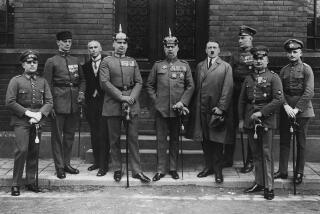Justice, Yugoslavian Style
The best analysis of the celebrated dissident trial that concluded the other day in Belgrade came from a diplomat: “The authorities have retreated some, but it doesn’t mean the cause of human rights has been advanced.”
Yugoslavia has extraordinary problems in this, the fifth year since the death of Marshal Tito. The centrifugal force of its fiercely proud, jealous and quite independent republics and autonomous regions places at risk the nation that they constitute. These tendencies are magnified by the deteriorating economic situation. There is fear, some of it justified, of external exploitation of those internal stresses both from the Soviet Union in the East and from anti-communist emigre groups in the West.
The difficulties of the situation have encouraged leaders to respond to challenges with cannons when fly swatters would serve. That sort of over-reaction was implicit in the decision to have this trial in the first place.
Six persons were originally charged with conspiracy against the state. In the end, three stood trial on the lesser charge of generating “hostile propaganda.” The trial of two other defendants is pending. Charges against the sixth defendant were dropped.
The openness of the trial was welcome. But the conviction of the three defendants, and the sentences ranging from 12 to 24 months, left a clear impression that intimidation of free discussion was intended, however open the proceedings.
These three men were guilty of making insulting references to the ruling Communist Party and had even said things defamatory of Tito, according to the presiding judge. What they insisted were scientific writings were, the judge found, nothing more than “political tracts,” including the master’s thesis on Yugoslav society written at Brandeis University by one of the defendants.
There were encouraging elements, however. Some intellectuals in Yugoslavia have resumed the private meetings in apartments, and the “open university” teaching and talking, that led to the original complaints in this case. And Milovan Djilas, the celebrated former associate of Tito, whose subsequent criticism led to years of imprisonment, was allowed to observe the proceedings and speak freely to the correspondents. The government has at least stopped short of bringing to trial again such a distinguished figure, despite his determination to criticize Tito and preach democracy.
If, as Djilas suspects, the trial marks the ascendancy of hard liners, that would bode badly for Yugoslavia. If, as many others judge, it represents a cautious move toward liberality, that could serve the nation well. For its problems will be all the harder to resolve if thought and innovation are strangled by the rigid orthodoxy of some, but only some, of Tito’s heirs.
More to Read
Sign up for Essential California
The most important California stories and recommendations in your inbox every morning.
You may occasionally receive promotional content from the Los Angeles Times.









